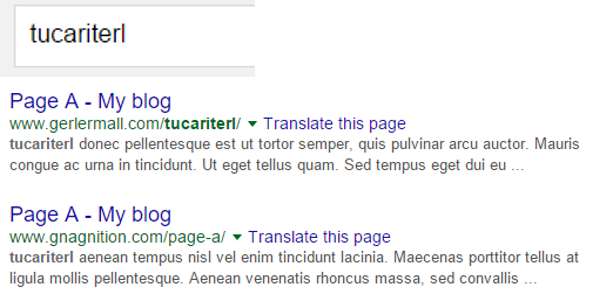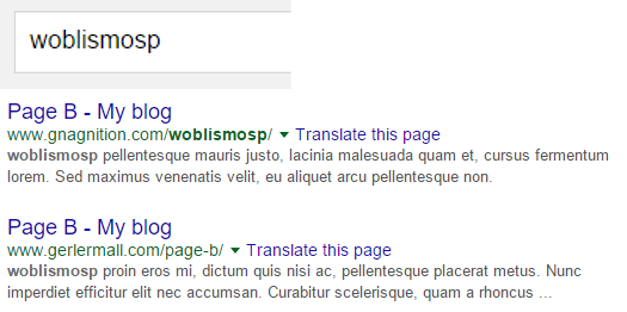Google uses around 200 unique signals in its algorithm themed mainly around content relevance, usability, and links. One thing that has always been credited with helping search rankings is URL structure. It was originally thought that SEO best practice included using keywords in the URL to help Google quickly identify what the web page was about and rank it, as well as to help consumers recognise whether the content was what they were looking for.
The impact a URL’s structure can have on rankings has been a widely debated topic in the SEO industry for a number of years now, and after the success of our “Does Google Crawl rel=”nofollow” links?” experiment back in August, we decided to do another one:
We set up competing sites on different domains that targeted the same, made-up keyword (with zero results in Google). The page on Domain 1 had the keyword in the URL while the page on Domain 2 didn’t. Both pages mentioned the keyword as the first word in the content, to ensure they would rank – so the only difference was the URL structure. The test was done twice with two different made-up keywords, to make sure we were seeing the same results.
Test requirements
- Two new and unused testing domains
- A made-up keyword for each test that didn’t return any results in Google’s index
- A page on each domain for each test with content that includes the made-up keyword
Test process
- Set up a live page for each test on both test domains using ‘lorem ipsum’ content
- Domain 1= gerlemall.com
- Domain 2 = gnagnition.com
- Select two random keywords with zero results in Google and place as the first word in the corresponding article on each test site
- Keyword 1 = “tucariterl”
- Keyword 2 = “woblismosp”
- On domain 1, include target keyword in the URL. On domain 2, do not include in URL. For the second test this is reversed – domain 2, include target keyword in the URL but on domain 1 do not
- Both pieces of content on both domains are linked to from the main navigation to ensure they can easily be crawled
- Fetch as Google to get the pages indexed
- Monitor results
Test results
13/01 – Set up site and fetch as Google on homepage (with “crawl all linked URLs”)
13/01 – Homepages indexed for both sites
14/01 – All pages indexed and ranking for keywords – highest ranked page for both keywords is the one with the keyword in the URL


Test conclusion
Within one day, both domains were ranking for the target keywords, and the highest ranked page was the one with the keyword in the URL. Although this test is fairly simple and only uses one ranking factor, it is a clear indication that keywords in the URL definitely have some impact on rankings.
Not long after conducting this test, John Mueller of Google was asked on a Google+ Hangout whether the keyword in the URL was a ranking factor. His reply was:
“I believe that is a very small ranking factor. So it is not something I’d really try to force. And it is not something I’d say it is even worth your effort to restructure your site just so you can get keywords in your URL.”
So, while he has confirmed what our test results show – that keywords in the URL are indeed a ranking factor – both he and Google state that it is not worth going back and changing your URLs to include keywords. There is a risk/reward factor to consider – you may gain some additional benefit by having keyword optimised URLs, but it means that all of the URLs on your site would have to be 301 redirected, which could have negative consequences and outweigh the benefits of the change. When adding a new page or building a new site, however, it is worth including them where appropriate.
The impact that keywords in URLs actually have on rankings is likely to be the topic of an on-going debate. While they clearly do have an impact, it’s not clear how big that impact is, and our test doesn’t give us the answer, as it wasn’t in a commercial, competitive SERP. Google’s Search Engine Optimisation Starter Guide states:
“If your URL contains relevant words, this provides users and search engines with more information about the page than an ID or oddly named parameter would”
Does this mean that Mueller is simply playing down the impact keywords in the URL have on rankings? Or is it simply that with so many rankings factors, “keywords in the URL” is just one in 200 and, therefore, the individual impact had on a page is insignificant, unless combined with other on-page optimisation techniques?


